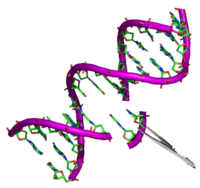
Photo from wikipedia
RNA interference (RNAi) involves a natural mechanism of gene regulation and an antiviral defense system in eukaryotic cells, resulting in sequence‐specific degradation of RNAs. Recent studies demonstrated the feasibility of… Click to show full abstract
RNA interference (RNAi) involves a natural mechanism of gene regulation and an antiviral defense system in eukaryotic cells, resulting in sequence‐specific degradation of RNAs. Recent studies demonstrated the feasibility of using RNAi‐based strategies to reduce insect pests or increase the health of beneficial insects. This technology permits the development of strategies to control a single insect species, with possibly no negative effects on non‐target species, like honey bees or parasitoids. Focus on the development of topically applied RNAi‐based approaches to manage insect pests and pathogens may provide environmentally sound products for use across all agriculture production systems. Herein presented are methods to develop RNAi‐based control to the Asian citrus psyllid (ACP), Diaphorina citri Kuwayama (Hemiptera: Psyllidae), vector of citrus Huanglongbing (HLB). Described is an RNAi feeding bioassay, called in plant system (iPS), which uses vegetative new‐growth citrus flush to deliver double‐strand RNA (dsRNA) to ACP during natural feeding. The iPS demonstrated delivery of non‐specific dsRNA in ACP 72 h post feeding. Feeding on flushes treated with dsRNA targeting ACP Arginine Kinase (dsAK), caused relative transcript knockdown and psyllid mortality. Increasing the dose of dsAK or use of dsRNA triggers made to different regions of the AK mRNA did not increase psyllid mortality. The iPS bioassay provides an easy system for use across many plants to successfully deliver dsRNA to ACP and other hemipteran insects for research or RNAi development.
Journal Title: Entomologia Experimentalis et Applicata
Year Published: 2017
Link to full text (if available)
Share on Social Media: Sign Up to like & get
recommendations!